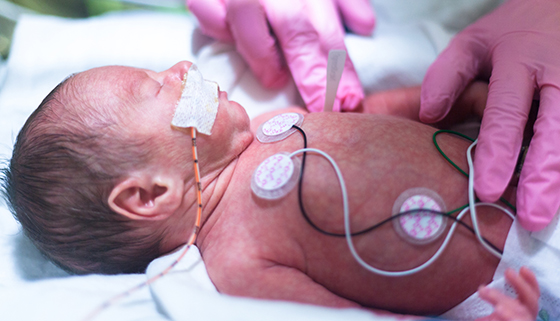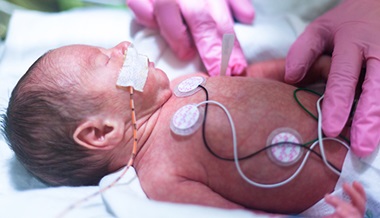Patient Story
Arteriovenous Malformation: Ashley's Story

Patient Story Highlights
- 14-year-old volleyball player Ashley experiences a sudden medical event during a game.
- Initially suspected to be a pinched nerve, a CT scan reveals a life-threatening brain bleed caused by an arteriovenous malformation (AVM).
- Ashley is admitted to Johns Hopkins All Children's Hospital and placed under close monitoring.
- She develops hydrocephalus and requires an external ventricular drain (EVD) to bypass the blockage.
- With support from her care team, friends, and family, Ashley begins to recover.
- Ashley faces radiation treatment and the possibility of another brain bleed in the future, but remains optimistic.
 Ashley with her Neurosurgeon, George Jallo, M.D.
Ashley with her Neurosurgeon, George Jallo, M.D.The cell phone video captures a remarkable moment in time … the moment before life would change for 14-year-old Ashley and her family.
The video clip is not unlike what any proud parent of a child who excels in sports would possess.
It shows Ashley in her “element,” playing her heart out in a volleyball game with her Osceola Fundamental High School Warrior teammates.
Ashley moves with energy and confidence on the court — looking every bit the talented athlete she has proven herself to be. She zeros in on an opportunity to slam the ball over the net — and takes it.
No one could possibly have guessed that she was just a heartbeat away from a serious medical event.
Ashley rotates out to allow for other players and other plays — part of the regular game plan. But as she is sitting on the bench, she realizes something isn’t right.
“The only way I can describe it is that all of a sudden I felt like everything above my shoulders was going to explode,” Ashley says. “My body was shaking, and I didn’t know what to do.”
Her parents, Mark and Stephanie, see the trainer motion to the couple to join them outside the gym area.
Could it be a pinched nerve? As the trainer and parents try to determine the problem and how to help — Ashley does something out of character.
“She’s kind of a germophobe,” Stephanie says. “But she literally lies down on this public school floor, and that is very unlike her.”
The family takes her home to care for her there, still believing she may have a severely pinched nerve. She takes a hot bath and tries to rest, but she doesn’t feel right. Her color is turning pale and ashen.
With their sense of alarm rising, Ashley’s parents rush her to an emergency center near the family’s home. What could be going on? A CT scan reveals something far more serious than a pinched nerve.
Ashley had suffered a life-threatening brain bleed.
Arteriovenous Malformation
The young teen is rushed to Johns Hopkins All Children’s Hospital and admitted to the pediatric intensive care unit. She and her family begin to learn details about her diagnosis. An arteriovenous malformation (AVM) occurs when arteries and veins don’t form correctly in an area of the body. The blood vessels can rupture and sometimes cause impairment or death.
Ashley’s AVM is located deep in the cerebral hemispheres of her brain, in the basil ganglia.
“AVM’s are extremely uncommon in children,” says George Jallo, M.D., a pediatric neurosurgeon and medical director of the Institute for Brain Protection Sciences. “We expect that people are born with them or develop them, but it’s more commonly presented in people in their 30s or 40s.”
AVM’s can be challenging to treat. Their location can make an operation too high-risk, as an angiogram ultimately reveals to be the case with Ashley. Jallo and the team move forward with a plan to monitor her closely in the coming days.
She will eventually require a focused radiation treatment at a different facility to destroy the AVM, to help prevent further ruptures. But for now — they need to give the bleed every chance to be slowly and safely absorbed and cleared by the body.
Brain bleeds resulting from AVM’s can be unpredictable — so the team remains prepared to respond to any problems that may arise.
“It was such a shock,” Mark says. “We had gone from having a perfectly healthy, beautiful girl eight hours earlier to our child struggling for her life.”
A few days into her stay, Ashley’s struggle becomes more complicated. She is showing signs of lethargy. Her ventricular pressure begins to increase. She is developing hydrocephalus.
“Dr. Jallo came in and explained to us why she was going to urgently need to have a drain put into her head,” Mark says. “He was very thorough and helpful.”
The external ventricular drain (EVD) was successfully placed, allowing the blood and fluid to bypass the blockage. The clinical team adjusted the drain valve as needed over the course of a week. Things began to look brighter for Ashley.
Nothing but Love
Slowly, but surely, Ashley began to feel more like her old self again. Meanwhile, she was feeling plenty of love from those who cared about her. People brought signs of support and stood outside of the hospital where Ashley could see them through the window. She received cards and messages from “the entire volleyball world.” Her brother, Luke, made Ashley a YouTube video starring 65 – yes, 65 — of her friends and family members.
By this time, Ashley and her family had developed a deep respect and affection for her clinical care team.
“Dr. Jallo’s whole team, including Dr. Luis Rodriquez, they were amazing, not only in their care, but in their bedside manner,” Mark says. “And the nurses were a godsend for us. We could not have asked for better people to take care of our daughter.”
Fifteen days after that one life-changing day, Ashley is discharged from Johns Hopkins All Children’s Hospital. She still has a radiation treatment ahead of her. Her days on the volleyball court have ended for now, maybe for good. And she knows that because of her condition, another brain bleed is a possibility in her future.
That is more change and uncertainty than a 14-year-old deserves to have. But Ashley is an optimist. She falls back on what she has learned putting in all those hours on the volleyball court, as she serves up wisdom beyond her years.
“You just have to always remember to play your very best game. Because you never know.”
Ashley's Surgeon
Johns Hopkins All Children's Neurosurgery
We know you want what's best for your child. We're ready to assist you with your questions.





